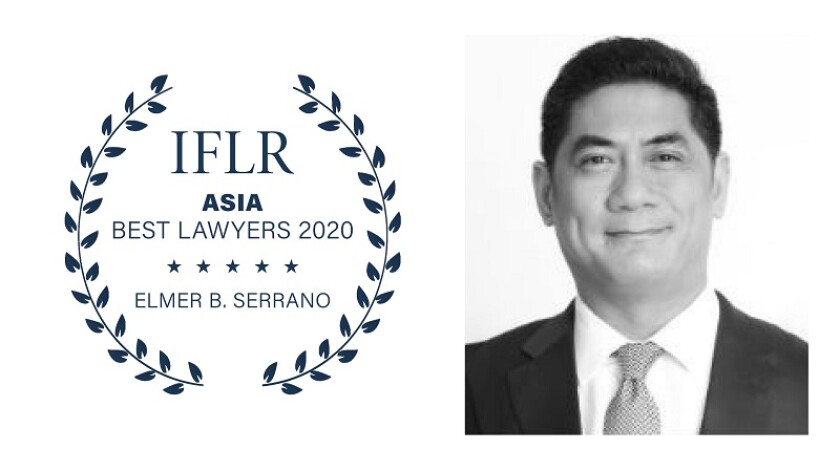As an IFLR1000-ranked Highly Regarded corporate finance lawyer for the Philippines, what do you consider to be the greatest achievements of your career?
It is very difficult to point to only a few achievements. But if I were to pick those most meaningful to me, three come to mind, and each for a very different reason.
The first clear achievement is having founded and developed, along with my partners, our law firm: Martinez Vergara Gonzalez & Serrano (MVGS). I know of only one law firm other than MVGS whose founders include a batchmate of mine from law school, and he partnered with more senior lawyers. MVGS is one of the few firms whose founding partners are all of the same age range and are friends, three of whom are from my batch. We did not take advantage of the certainty of partnering with established lawyers to bring gravitas and clients to the firm. The four of us, founding partners, gambled and set up MVGS, knowing our limitations and comparable lack of experience. In the relatively short period of 13 years, we have grown MVGS into an institution of 35 lawyers, and established it as a mid-sized firm that works regularly on the same transactions as the much older and bigger law firms.
|
|
I know of a lawyer who grew a beard just so clients would listen to him |
|
|
Second, and from another dimension, I cannot help but smile when looking back at my small contribution in shaping the banking industry. Early in my career, I was fortunate to play an instrumental role in the merger of then Equitable Banking Corporation and the behemoth PCI Bank. My participation later on parlayed into what would turn out to be the biggest banking M&A transaction at the time - the Equitable-PCI Bank and Banco de Oro merger - creating what is today the biggest bank in the Philippines, BDO Unibank. The bank is nearly 50% bigger in asset size and in most other measures to its next peer. I am particularly pleased that the principals of these banks are all still my clients 25 years later.
These enduring relationships are a good lead into what I consider the most significant achievement of my career: the continuing and growing trust of my clients. As a case in point, I am now the corporate secretary, appointed at a relatively young age, of the listed companies of the SM Group - SM Investments Corporation, the biggest conglomerate in the country, SM Prime Holdings, the largest real estate company in the Philippines, and their other publicly listed affiliates. I am humbled by the fact that I did not seek nor expect that honour. When SM Group’s former corporate secretary of two decades (a partner from one of the biggest law firms in the country) retired, his law firm early on offered their most senior partners to assume that position. However, I was called to a meeting by SM Group and was offered these positions.
More than fame and fortune, I believe it should be any lawyer’s career goal to earn and foster their clients’ trust.
What advice would you give to lawyers in junior positions to encourage them to work towards success?
The age-old adages, “hard work is the key to success” and “you can do it, just believe in yourself”, come to mind. Cliché as it may sound, I will humbly point to my own career as proof. I was fortunate to have what is most important at the beginning of my career - what my mother provided me, a good education. As my own career started it was immediately fraught with challenges and I had very little reason to think it would surpass mediocrity. But I believed in hard work and in doing the right thing, so I did just that.
|
|
Private enterprises will regroup, re-align and re-invent themselves |
|
|
Budding lawyers have to understand that their natural skills as a lawyer will show in their work and people will notice. Opportunities will open up. They just have to be willing to work hard with integrity, and they will engender confidence and more importantly, genuine trust. Whether you want to run your career like a 100-meter dash or a marathon, there is no substitute for hard work. Younger lawyers need to cultivate the right attitude towards work and workload. Work assignments are not torture. Rather, they are a manifestation of trust and a signal that their good work has been noticed and hence, should be embraced and appreciated.
What do you feel are the biggest obstacles for young and prospective lawyers in your country?
When new lawyers enter the profession, they are already empowered with knowledge and tools. Nowadays, they are better prepared with easy access to information and technology compared to say, our generation, for whom the cement walls of private and public libraries were a familiar setting when doing research. However, our profession remains so dominated by senior practitioners that it is very hard for young lawyers to get noticed, to be taken seriously, and to get hands-on experience (I know of a lawyer who grew a beard just so clients would listen to him). Senior lawyers should take the rookies under their wings and the system should encourage that somehow.
What does your firm do to nurture and promote talent? Do you think it compares well to others in your market in this area?
MVGS values our lawyers and that is the reason behind our mentorship programme. We assign every associate a mentor, a partner, who guides their training, monitors their career development and fosters their work ethic.
Our firm also has an established rotation programme that allows first-year associates to be assigned work from all departments, so their fundamentals are reinforced at the onset of their career. This exposure allows our lawyers to make an informed decision of the practice area that they want to specialize in.
The medium size of the firm likewise enables all our lawyers to get the right amount of exposure and workload to harness their potential. As they stay longer, we entrust them with bigger responsibilities and they take on bigger roles.
MVGS also encourages each lawyer to join professional organisations and develop specialised skills as part of the firm’s trust to ensure the professional development of individual lawyers.
These are just the highlights of the programmes we adopted and with those, I believe MVGS is ahead of other firms similar in size and at par with the bigger outfits.
If you could introduce one policy across the entire legal profession what would it be?
What the new blood today need is a way to expedite the gathering of experience. We noticed that most young lawyers are raw, maybe owing to lack of significant exposure during and immediately after law school; this a crucial period in which to mould them. While apprenticeship is required, interns are often assigned menial tasks or at best, research. I would promote a more meaningful apprenticeship programme that is focused on the practical aspects of the legal profession, with a feedback mechanism and assessment not only of the apprentice but also of the supervising lawyers. The programme should be able to engender exposure to real life practice and issues in order to develop an intern’s practical perspective and problem-solving skills, so when they step into practice, they’ll be ready. To achieve this, mentor lawyers should be incentivised in some way to train the apprentice, maybe by way of credit to his or her Mandatory Continuing Legal Education requirements.
Are there any initiatives in the firm to help your clients deal with the repercussions of theCovid-19 pandemic?
This pandemic has forced everyone to adapt rapidly, including in the government (from the President, to Congress, to regulators), which has been churning out new laws and rules at a quickened pace. Our firm keeps tabs of these issuances and prepares summaries and articles on all areas, including corporate, commercial, dispute resolution, immigration, tax and labour law. These are readily available on our website and are sent via email to clients, enough to give them a perspective that makes it easier for them to decide whether they need to seek legal advice and help them formulate the questions they may want to specifically ask us. More importantly, we have made it a policy that our lawyers reach out and keep in touch with our clients so that they know that regardless of the prevailing quarantine and the remote working arrangements, legal advice from MVGS is readily accessible. We are pleased that in these trying times, our clients have had us top of mind. Our reliable brand of service has encouraged them to turn to us in times of need.
Looking to the future
Given the conditions in the Philippines, what would you consider to be the market outlook over the coming year?
I still believe that the Philippine market outlook remains positive. There has been a shake-up but the established pillars of business that have developed resiliency over the years will survive and prevail. There will be much change in the individuals in the next tiers who will operate post-Covid-19, and modes of doing business will change. Private enterprises will have to be smarter and nimbler to take advantage of opportunities as they arise.
Surprisingly, capital market offerings continued amid the quarantine and in quite significant deal sizes. Our firm has of late handled some of the biggest bond offerings, both local and international, in the month-long window when a relaxed community quarantine was permitted. A client also undertook its maiden issue of enrolled notes in under three weeks, and what is so far the only IPO during the pandemic was handled by MVGS.
What kind of work do you expect will keep you busy over the next 12 months?
I foresee that MVGS will remain busy in its core strengths: M&A, capital markets, and banking and finance.
Recovering from quarantine, private enterprises will regroup, re-align and re-invent themselves. Mergers will be tapped to build stronger entities. I foresee more acquisitions by those with access to capital of those that are looking to exit business. Government will provide funding and incentives, so M&A will be busy.
|
|
Interested investors should choose their lawyers well |
|
|
Companies will be looking to raise capital through debt or equity either to re-build, develop resiliency or to take advantage of investment opportunities. With the more realistic implementing rules and regulations for real estate investment trusts (REITs) already out, clients have already begun to tap our firm - this will likely become a trend.
In banking and finance, loans will have to be availed of in order to buoy companies post-pandemic or to finance M&A. We also anticipate that a significant number of loans will have to be restructured.
Hand-in-hand with these three areas, our bourgeoning tax practice will play a key role, especially in navigating the many fiscal and regulatory incentives that the government will offer to spur the economy.
Are there any upcoming regulatory changes or initiatives that investors should be aware of?
The country’s economy will have to be revived and economic recovery and stimulus laws that will bring about significant regulatory change and initiatives in the near term are already in the offing.
Mergers and consolidations will be encouraged. Special purpose vehicles, both public and private, are being established with considerable funding.
Regulatory and tax incentives, even exemptions, are underway.
The Bangko Sentral ng Pilipinas (BSP) will be granted considerable latitude to relax the implementation of regulations and to provide incentives to banks relative to consumer finance. The BSP has already issued circulars to enhance its procedures on digital payments and audits.
The Securities and Exchange Commission has also issued new rules expanding investor participation amid the pandemic and providing flexibility in its reportorial requirements.
Notably, the Supreme Court has not only embraced game changing procedural rules involving virtual proceedings for litigation, but for notarisation protocols as well, paving the way for e-commerce to take off.
What do you feel is the biggest misconception others have about your market?
The biggest misconception others have of the Philippines is, in my opinion, that we are politically unstable, volatile and too unpredictable to conduct business. Due to what is often viewed as poor governmental support from one administration to another, private businesses have adapted and learned not to rely on the government to operate to a point that politics is discounted. To a large extent, the government has also taken a hands-off approach to private commerce, which has in turn thrived. Overall, legal and regulatory frameworks and international best practices enshrined over the years provide adequate safeguards to doing business in the Philippines. The Philippines’ steady growth, measured by almost all economic indicators, over the last couple of decades is testament to that.
What is the one thing you think the IFLR’s international audience should know about how to successfully do business in your market?
First: Know Your Country. The Philippine market is unique in so many ways. It is one of the biggest consumer populations spread across a small stretch of real estate, with income spanning the globe. Investors and consumers in the country are adept with technology and social media. Of course, our local culture, people and their habits are not to be discounted. I have assisted exits of foreign companies from the Philippines enough in my career to gather that most failed because they did not know our market well enough.
Second: Know Your Counsel. Interested investors should choose their lawyers well. In this market, their lawyers should be commercially minded, able to appreciate their goals and to show them the best way to achieve them - this is exactly what MVGSprides itself on being.


